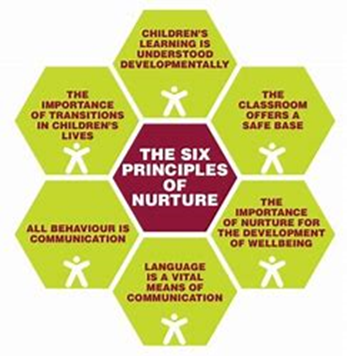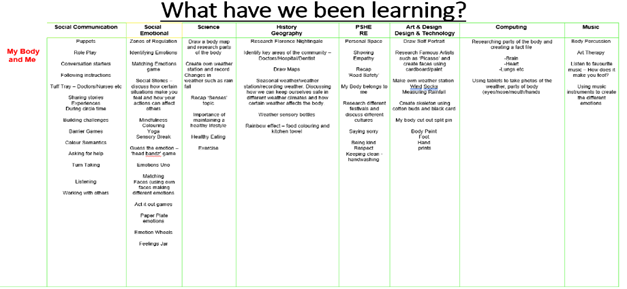Nurture Group
Welcome to the Hive
Nurture Group: Overview
The Hive is the base for our school Nurture Group Provision. Our Nurture group runs every afternoon with a maximum of 8 children per session. This is offered via referral for children in Year 1, 2 and Year 3 in a relaxed setting with a smaller group of children. Children attend the Hive in the afternoons on an individual timetable basis. All children attend their mainstream class setting in the mornings. The children are supported across the sessions by Mrs Papaphillipou- Nurture Group Lead, Miss Busher- Nurture group practitioner and Miss Humpries Nurture group practitioner. The provision Nurture Group is overseen and supported by Mrs Thurgood-Inclusion Lead and Miss Taylor- Assistant SENDco from the SEND Team.
Nurture Group assess the children’s learning and social needs and provides the children with the necessary support to help remove any barriers to their learning.
Our Nurture Group’s way of learning is based around:
The six principles of Nurture Group-

For More information, please visit www.nurtureuk.org
Our Nurture Group aims to promote the children’s confidence, self-esteem, independence, concentration, develop language skills, build positive relationships and improve their social skills.
The children follow a structured learning routine linked to the KS1 curriculum, the sessions include individual and group targeted interventions such as Listening and speaking, turn Taking, following Instructions, motor skills, barrier games and understanding emotions including The Zones of Regulation.
Nurture Group: Overview
The afternoon sessions include elements of the curriculum-based subjects i.e., Science, History, Geography, Music, computing etc. During our sessions, emphasis is also placed upon building positive relationships/friendships, sharing/turn taking skills and working in collaboration.
The sessions are planned and structured to maximise the impact on the individuals, tailoring to the individual needs of the children who attend. Our learning experiences contribute to the holistic experience of Nurture Group and provide significant benefits for all the individual children that attend our Nurture group.
A typical session will consist of:
1. Welcome (children Transition into the Hive)
2. Circle Time- Who is here today? (Each child finds their name and self-registers)
-Date and weather chart
-Discuss the learning topic
-Nurture Group Song
3. Learning based input/delivery (Nurture group Lead introduces/delivers todays Learning)
4. Adapted Related learning tasks (activities, craft, sensory etc.)
-All children complete 2 topic related tasks
- Once Completed children put completed task stickers on
their chart.
- Children are able to learn choosing time.
5. Snack Time (Preparation skills, social skills, new experiences etc.)
All adults and children sit together to make snack, talk and tidy up.
6. Sensory conclusion (Sensory circuits/Sensory diets)
-Children then tidy up and return to their class to get ready to go home.
Termly topics are delivered by the Nurture Group Lead, the includes adapted learning to support the individual needs of each child attending our Nurture group provision.

It is our hope that the children will transfer their confidence, knowledge, understanding and learning skills back into the classroom.
Assessment information.
The Boxall profile is used for assessment – The Boxall Profile is an assessment of a child’s social and emotional aptitudes. It was developed through many years of research by Educational Psychologist, Marjorie Boxall and has been used widely in schools and for research for over 20 years.
The profile has its base in Attachment Theory and allows an insight into a specific child’s behaviour and enables planning for teaching, taking into account specific strengths and weaknesses.
The Boxall Profile is an invaluable toolkit for helping staff to develop a precise and accurate holistic understanding of children's emotional and behavioural difficulties, enabling the nurture group staff team to plan and deliver effective supporting activities and targeted interventions.
Children are reassessed termly allowing staff to measure a child’s progress towards their targets and feed this into their one planning cycle.
Interventions- overview of targeted interventions
During the sessions, our Nurture group practitioners work with the children on an individual/small group basis to deliver targeted emotional regulation and Speech and language interventions.
- The Zones of Regulation develop self-regulation skills and emotional awareness. Based on the “Zone of emotions" framework, children are able to relate their feelings and emotions into four colour coded Zones: Blue- (Low energy and sad) Green- (calm, focused and ready to learn) Yellow- (excited or anxious) and Red-(Angry, aggressive or agitated)Through structured activities, discussions and visual supports, children can begin to learn to recognise and understand their emotions, identify triggers, use practical tools and develop strategies to regulate themselves.
This approach emphasises self-awareness, self-control and problem-solving skills, empowering them to navigate social interactions, cope with stressors and adapt to various situations more effectively.
- The speech and language intervention programme is designed to support individuals who may experience difficulties with communication and language development. These interventions are tailored to address a range of challenges, including articulation disorders, language delays, fluency issues, and difficulties with pragmatic language skills (such as social communication). Through targeted activities, therapy sessions, and exercises, individuals receive specialised support to improve their communication abilities and build confidence in expressing themselves effectively.
Nurture Group Gallery
Parent/guardian involvement is actively encouraged and welcomed. Working together in partnership with families benefits the outcomes for all our children.
